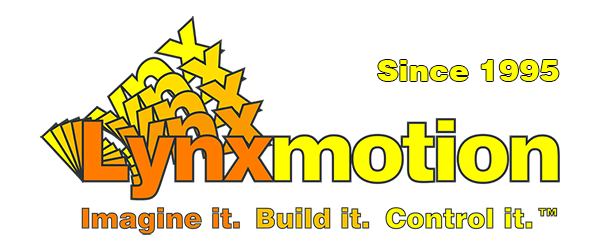Wiki source code of SES V2 - External Gears
Version 6.1 by Eric Nantel on 2018/04/30 09:26
Show last authors
| 1 | = Gears = |
| 2 | Edit |
| 3 | 16T driven + 48T idler = 3:1 ratio |
| 4 | |
| 5 | LSS Gear - 16T - Gearbox.png |
| 6 | |
| 7 | This has the effect of increasing the torque by a factor of 3x while decreasing the maximum speed and overall angle by a factor of 3x. Therefore a full rotation of the output horn will result in a 120 degree travel of the larger 48 tooth gear. For high torque, high axial or radial loads, use the external gear bracket assembly. Center distance when using these two gears is 1.00 inches. |
| 8 | |
| 9 | 32T driven + 32T ideler = 1:1 ratio |
| 10 | |
| 11 | LSS Gear - 32T Gearbox - Top.png |
| 12 | |
| 13 | This has no effect on gearing, rpm or overall angle. Having both gears on the LSS creates a second driven axis. A 1:1 configuration can be used with the gear bracket where high axial or radial loads exist. Center distance when using these two gears is 1.00 inches. |
| 14 | |
| 15 | = External Gear Specs / Drawing = |
| 16 | Edit |
| 17 | {Include image showing what each value represents - use Wikipedia or any other site "Spur gear nomenclature"} |
| 18 | |
| 19 | 16T Driven 48T Idler 32T Driven 32T Idler |
| 20 | Teeth 16 48 32 32 |
| 21 | Pitch 16 |
| 22 | Pressure Angle 20 20 20 20 |
| 23 | Pitch Diameter 1" 1" |
| 24 | Outer Diameter 1.06" 1.06" |
| 25 | Material Aluminum Aluminum |
| 26 | Spline |
| 27 | |
| 28 | = Spline = |
| 29 | Edit |
| 30 | LSS Gear - 16T - Splines.png |
| 31 | |
| 32 | The spline used on the LSS external gears is a 24 tooth version which is compatible with Hitec components. |
| 33 | |
| 34 | = Gear Bracket Assembly / Mounting & Parts = |
| 35 | |
| 36 | Show in images how to assemble the gear bracket with various parts: bearings, shaft, shaft retainer, idler, gear (two options). Include RobotShop Parts #s |
| 37 | |
| 38 | = LSS External Gear Mounting Options = |
| 39 | Edit |
| 40 | There are various ways to mount the gears to the servo without using the gear bracket. Below are just some examples showing gears mounted with and without the gearbox bracket. Note that the gearbox bracket can be mounted on multiple sides of the servo. The gearbox bracket is used largely for applications with higher forces (axially and radially) and higher torque. |

